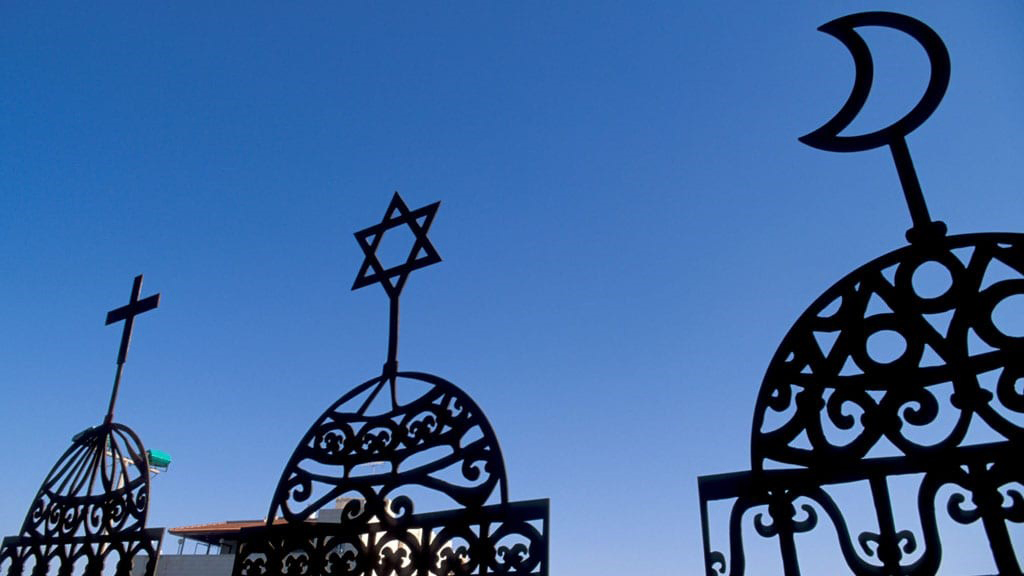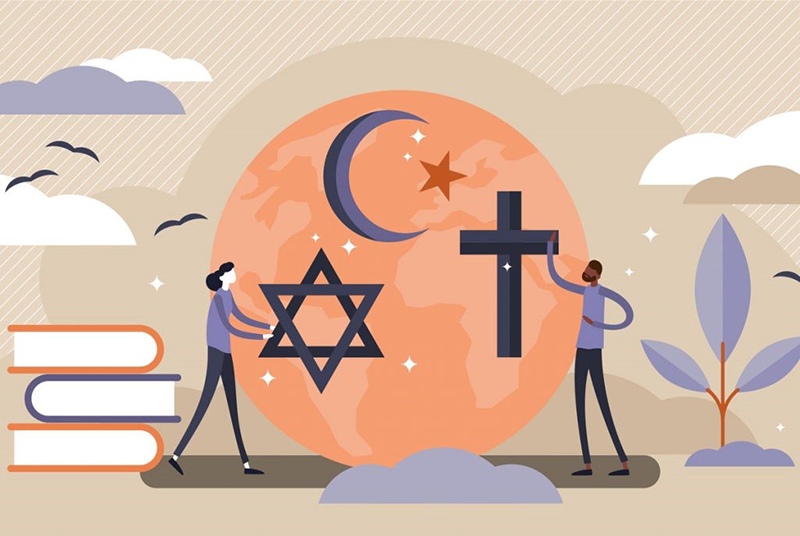Prophets serve as intermediaries between the divine and humanity, conveying guidance, laws, and moral teachings. Despite the shared figures, each religion presents unique narratives and theological interpretations, reflecting its distinct identity and purpose.
Shared Prophets in Abrahamic Religions
The Abrahamic Faiths-Judaism, Christianity, and Islam-find their spiritual roots in the patriarch Abraham, whom they also regard as a prophet and an exemplary model of faith. Many of the prophetic figures are shared across these religions, though their roles, narratives, and theological significance can differ widely across the traditions. It attests to intertwined histories and the monotheistic basis of these faiths, but variations in the stories reveal unique theological interpretations and emphases.
Adam
Islam: Adam (Ādam) is considered the first human and prophet. He was created by Allah from clay and is believed to be the father of all humanity. He lived in paradise (Jannah) and was tested by Allah.
Christianity: Adam is the first human created by God in the Book of Genesis. He lived in the Garden of Eden with Eve until they were banished for eating from the Tree of Knowledge.
Judaism: Similar to Christianity, Adam is the first man created by God in Genesis. He is a foundational figure in Jewish teachings, representing the beginning of humanity.
Noah (Nuh)
Islam: Nuh is considered a prophet who was sent to warn his people about their sinful ways. He built the Ark to save his followers and pairs of animals from a great flood sent by Allah.
Christianity: Noah is a key figure in the Genesis flood narrative. He was chosen by God to build an Ark to save his family and animals from the flood sent to cleanse the world of wickedness.
Judaism: Noah is a righteous man who obeyed God’s command to build an Ark, preserving his family and animal species during a divinely sent flood to purge the earth of its corruption.
Abraham (Ibrahim)
Islam: Ibrahim is a highly respected prophet known for his unwavering faith in Allah. He is the patriarch of Islam and built the Kaaba in Mecca, he destroys the idols in the temples that people build to worship, except for the largest one. When his people discovered the destruction, they were furious and questioned Abraham. He cleverly pointed to the largest idol and suggested that they ask it who was responsible. This act highlighted the absurdity of worshipping objects that could neither protect themselves nor communicate. This story underscores Abraham’s commitment to monotheism and his courageous stance against idolatry, serving as an important lesson in all three Abrahamic religions.
Christianity: Abraham is a pivotal figure in the Bible, known as the father of many nations. His covenant with God is a foundational element in Christian teachings.
Judaism: Abraham is regarded as the founding patriarch of the Jewish people. He is central to Jewish history, known for his covenant with God and his role in establishing monotheism.
Moses (Musa)
Islam: Musa is a major prophet who led the Israelites out of Egypt. He is known for receiving the Torah from Allah on Mount Sinai.
Christianity: Moses is a central figure in the Old Testament, leading the Exodus from Egypt and receiving the Ten Commandments from God on Mount Sinai.
Judaism: Moses is a key prophet in Judaism. He led the Israelites out of slavery in Egypt, received the Torah on Mount Sinai, and guided the people through the desert.
David (Dawud)
Islam: Dawud is revered as a prophet and king. He is known for his bravery, wisdom, and the Psalms (Zabur) he received from Allah.
Christianity: David is a significant figure in the Bible, known as the second king of Israel and author of many Psalms. He is celebrated for his faith and leadership.
Judaism: David is a central figure in Jewish history, known as a warrior king and the author of many Psalms. He established Jerusalem as the capital and brought the Ark of the Covenant there.
Solomon (Sulayman)
Islam: Sulayman is a prophet and king known for his wisdom, ability to communicate with animals, and control over jinn (spirits). He built the First Temple in Jerusalem.
Christianity: Solomon, the son of David, is known for his wisdom, wealth, and building the First Temple. His reign is detailed in the Books of Kings and Chronicles.
Judaism: Solomon is renowned for his wisdom, wealth, and construction of the First Temple. His reign is a significant period in Jewish history, celebrated for peace and prosperity.
Jesus (Isa)
Islam: Isa is considered a major prophet and the Messiah, born to the Virgin Mary (Maryam). He performed miracles and is believed to return before the Day of Judgment.
Christianity: Jesus is the central figure of Christianity, believed to be the Son of God and the Savior. His life, crucifixion, and resurrection are foundational to Christian faith.
Judaism: Jesus is not recognized as the Messiah or a prophet. In Jewish tradition, he is seen as a historical figure, but his role and significance differ from Christian and Islamic perspectives.

Theological Significance of Unique Prophets in each Abrahamic Religion
The unique prophets in each tradition reflect the specific messages and values emphasized within their religious frameworks:
- Judaism: Prophets like Samuel, Nathan, and Ezekiel emphasize covenant faithfulness, ethical leadership, and hope during periods of exile and renewal. They serve as moral and spiritual guides, ensuring adherence to the Mosaic Law.
- Christianity: Figures like John the Baptist and Anna bridge the Old and New Testaments, highlighting the fulfillment of prophecy and the advent of Jesus as the Messiah. They reinforce the Christian focus on salvation and the continuity of God’s plan.
- Islam: Unique prophets such as Hud, Salih, and Shu‘ayb illustrate the universal scope of Islamic prophethood, addressing diverse communities across different times and places. Their stories emphasize monotheism, ethical behavior, and accountability before Allah.
Common Themes in Prophetic Narratives
Common themes in the prophetic narratives of Judaism, Christianity, and Islam showcase the very core principles of Abrahamic faiths, harnessed from monotheism, moral guidance, and divine justice, which account for the universal role of prophets as God’s messengers to bridge the two realms. While there are indeed differences in details and emphasis, the shared themes really underscore spiritual unity and ethical frameworks at the heart of these traditions.
- Monotheism and Divine Unity
One of the most significant themes in prophetic narratives is the call to worship one God, rejecting idolatry and polytheism. This theme is foundational in all Abrahamic religions and central to the mission of their prophets.- Judaism: Prophets like Moses and Elijah emphasize the worship of Yahweh as the one true God. Moses’s confrontation with Pharaoh in Egypt and Elijah’s challenge to the prophets of Baal (1 Kings 18:20-40) are vivid examples of this theme. The prophets repeatedly call the Israelites to forsake idols and remain faithful to the covenant with Yahweh.
- Christianity: Monotheism is upheld and deepened in Christianity through the teachings of Jesus, who emphasizes the oneness of God while introducing the concept of the Trinity. Jesus’s declaration of the greatest commandment— “Love the Lord your God with all your heart and with all your soul and with all your mind” (Matthew 22:37)—reaffirms this central theme.
- Islam: The Quran strongly reinforces monotheism, with prophets like Muhammad (Peace be upon him), Ibrahim, and Musaand all others calling humanity to worship Allah alone. The message of Tawhid (the oneness of Allah) is emphasized in verses like, “He is Allah, [who is] One” (Quran 112:1). This theme serves as the cornerstone of Islamic belief.
- Moral and Ethical Guidance
Prophets serve as moral exemplars and ethical teachers, guiding their communities to live righteously and align their behavior with divine will. Their teachings often address social justice, personal integrity, and communal harmony.- Judaism: Jewish prophets like Amos and Micah advocate for justice, compassion, and humility. Amos condemns social injustice, saying, “Let justice roll down like waters, and righteousness like an ever-flowing stream” (Amos 5:24). Prophets in the Hebrew Bible frequently challenge the powerful to protect the vulnerable and uphold ethical standards.
- Christianity: Jesus expands the ethical teachings of earlier prophets by emphasizing love, forgiveness, and humility. The Sermon on the Mount (Matthew 5-7) presents a moral vision that prioritizes inner purity and compassion over legalistic adherence to laws. For example, Jesus teaches, “Blessed are the peacemakers, for they will be called children of God” (Matthew 5:9).
- Islam: The Quran portrays prophets as role models of piety, honesty, and patience. The Prophet Muhammad’s (Peace be upon him) life serves as a practical example of ethical conduct, embodying principles such as truthfulness (Siddiq), trustworthiness (Amin), and justice (‘Adl). Stories of earlier prophets also emphasize the importance of ethical dealings.
- Divine Justice and Mercy
Prophetic narratives balance themes of divine justice with mercy, highlighting the consequences of disobedience and the rewards of repentance. These stories emphasize that while God is just and punishes wrongdoing, He is also merciful and forgiving to those who turn back to Him.- Judaism: The destruction of Sodom and Gomorrah (Genesis 19) illustrates divine justice, while the story of Jonah and Nineveh demonstrates God’s mercy. Jonah initially resists his prophetic mission, but when the people of Nineveh repent, God spares them, showing His willingness to forgive.
- Christianity: The teachings of Jesus often focus on mercy and forgiveness. The parable of the prodigal son (Luke 15:11-32) is a profound example, portraying God as a loving father who welcomes back repentant sinners. This theme underscores the Christian belief in salvation through grace.
- Islam: Divine mercy in Islam emphasizes Allah’s vast compassion, forgiveness, and care for His creation. Key aspects include:
Forgiveness: Allah forgives all sins if one repents sincerely.
Compassion: His care and provision for all beings.
Guidance: Sending prophets and scriptures for humanity’s guidance.
Promise of Paradise: Rewarding the faithful with eternal bliss.
Surah Az-Zumar (39:53): “Do not despair of the mercy of Allah. Indeed, Allah forgives all sins. Indeed, He is the Forgiving, the Merciful.”
Surah Al-Anbiya (21:107): “We have not sent you, [O Muhammad], except as a mercy to the worlds.”
- Call to Repentance
Prophets universally call their communities to repentance, urging them to turn away from sin and return to a path of righteousness. This theme underscores the importance of human accountability and the opportunity for redemption.- Judaism: Prophets like Jeremiah and Ezekiel implore the Israelites to repent and renew their covenant with God. Jeremiah’s plea, “Return, faithless Israel, declares the Lord” (Jeremiah 3:12), reflects this recurring theme.
- Christianity: John the Baptist’s ministry centers on repentance, as he prepares the way for Jesus by calling people to turn from sin and be baptized (Matthew 3:2). Jesus continues this call, emphasizing the need for repentance to enter the kingdom of God.
- Islam: The Quran consistently portrays prophets as warners who invite their people to repentance. The story of Nuh (Noah) illustrates this theme, as he spends years urging his people to abandon idolatry and seek forgiveness before the flood (Quran 11:25-48).
- Hope and Redemption
Prophets often bring messages of hope and redemption, reassuring their communities of God’s ongoing presence and His promise of salvation for the faithful.- Judaism: Prophecies of restoration, such as Isaiah’s vision of a new Jerusalem (Isaiah 65:17-25), inspire hope during times of exile and suffering.
- Christianity: Jesus’s resurrection symbolizes ultimate redemption, offering believers hope for eternal life and victory over sin and death.
- Islam: The Quran frequently reminds believers of Allah’s promise of Paradise for those who remain steadfast in faith and righteousness (Quran 18:30-31).

Divergent Narratives and Interpretations in Abrahamic Religions
While Judaism, Christianity, and Islam recognize many of the same prophets and basic themes, their narratives are often quite different in content, emphasis, or theological explanation.
These divergences come about through differing scriptures, cultural contexts, and theological objectives among the respective traditions. Discussing such divergences provides insight into the concept of a prophet and his message in each religion, pointing out both the commonalities and unique perspectives of their approaches.
- The Binding of Isaac/Ishmael
One of the most notable divergences in prophetic narratives is the story of Abraham’s willingness to sacrifice his son at God’s command, known as the Akedah in Judaism and the Dhabih in Islam. While all three traditions agree on the core themes of obedience and submission to God, the details differ significantly.- Judaism: The Hebrew Bible presents Isaac as the son whom Abraham is commanded to sacrifice (Genesis 22). This event is interpreted as a test of Abraham’s faith and a reaffirmation of the covenant between God and the Israelites. The narrative emphasizes Isaac’s role as the chosen son through whom the Jewish lineage continues.
- Christianity: Christians adopt the Jewish version of the story but interpret it typologically. Isaac’s near-sacrifice is seen as a prefiguration of Jesus Christ’s sacrifice on the cross. This interpretation underscores themes of atonement and salvation, central to Christian theology.
- Islam: The Quran does not explicitly name the son in the sacrifice narrative (Quran 37:100-113), but Islamic tradition identifies him as Ishmael, not Isaac. Ishmael is regarded as the forefather of Arab nations, and his role in the story highlights his significance in Islamic heritage. The focus is on Abraham and Ishmael’s submission to Allah’s will, exemplifying the essence of Islam.
- The Role of Jesus (Isa)
Jesus is a shared figure among the Abrahamic faiths, but his role and identity vary dramatically, reflecting each religion’s theological priorities.- Judaism: In Jewish tradition, Jesus is not considered a prophet or the Messiah. Instead, he is viewed as a historical figure whose claims to divinity and messianic status are rejected. The Jewish understanding of the Messiah differs fundamentally from Christian and Islamic interpretations, emphasizing a future political leader who will restore Israel.
- Christianity: Jesus is the central figure of Christianity, regarded as the Son of God, the Messiah, and the Savior of humanity. The New Testament portrays his life, death, and resurrection as the fulfillment of Old Testament prophecies, offering salvation to all who believe. His divinity and role as the second person of the Trinity are core Christian doctrines.
- Islam: jesus(isa) in Islam, Jesus (Isa) is regarded as a significant prophet and the Messiah, born to the Virgin Mary (Maryam) through a miraculous birth. He performed many miracles by Allah’s permission and conveyed His message to the people.
- Surah Al-Imran (3:45): “When the angels said, ‘O Mary, indeed Allah gives you good tidings of a word from Him, whose name will be the Messiah, Jesus, the son of Mary—distinguished in this world and the Hereafter and among those brought near [to Allah].'”
- Surah Al-Ma’idah (5:110): “Then Allah will say, ‘O Jesus, son of Mary, remember My favor upon you and upon your mother when I supported you with the Holy Spirit and you spoke to the people in the cradle and in maturity; and when I taught you writing and wisdom and the Torah and the Gospel; and when you designed from clay what was like the form of a bird with My permission, then you breathed into it, and it became a bird with My permission; and you healed the blind and the leper with My permission; and when you brought forth the dead with My permission.'” Isa is believed to return before the Day of Judgment to restore justice
- The Virgin Birth of Jesus
The story of Jesus’s birth diverges significantly in interpretation, although both Christianity and Islam affirm its miraculous nature.- Christianity: The virgin birth is a cornerstone of Christian belief, symbolizing Jesus’s divine nature and his role as the incarnate Son of God. The Gospels of Matthew and Luke describe the angel Gabriel announcing Jesus’s conception to Mary, emphasizing the fulfillment of Old Testament prophecy (Isaiah 7:14).
- Islam: The Quran also affirms the virgin birth, with the angel Gabriel appearing to Mary (Maryam) to announce the miraculous event (Quran 19:16-21). However, in Islamic theology, the virgin birth is seen as a sign of Allah’s power rather than evidence of Jesus’s divinity.
- Judaism: The virgin birth is not recognized in Jewish tradition, as Jesus is not considered a prophet or the Messiah. The concept does not align with Jewish theological expectations for the Messiah.
- The Story of Moses (Musa)
Moses is a central figure in all three religions, but the emphasis and details of his story vary.- Judaism: Moses is the greatest prophet in Judaism, serving as the liberator of the Israelites and the lawgiver who received the Torah at Mount Sinai. His leadership during the Exodus and his role in establishing the covenant are foundational to Jewish identity.
- Christianity: Moses is acknowledged as a precursor to Jesus, whose mission fulfills and surpasses the Mosaic Law. The Sermon on the Mount, where Jesus reinterprets and deepens the commandments, is often seen as a parallel to Moses receiving the Law on Mount Sinai.
- Islam: Moses (Musa) is one of the most frequently mentioned prophets in the Quran, celebrated for his perseverance and submission to Allah. The Quranic narrative emphasizes his role as a warner to Pharaoh and his leadership in guiding the Israelites to monotheism. Unlike the Bible, the Quran focuses less on the covenantal laws and more on the moral and spiritual lessons of his story.
- The Prophet Muhammad (Peace be upon him)
The figure of Muhammad (Peace be upon him) introduces a divergence unique to Islam. While Judaism and Christianity do not recognize him as a prophet, Islam regards Muhammad (Peace be upon him) as the Seal of the Prophets, bringing the final and complete revelation of God.- Judaism and Christianity: Muhammad (Peace be upon him) is not mentioned in the Jewish or Christian scriptures, and his role as a prophet is not acknowledged within these traditions. From their perspective, the prophetic line ended with figures like Malachi (Judaism) or John the Baptist (Christianity).
- Islam: Muhammad (Peace be upon him) is viewed as the last and greatest prophet, whose life and teachings exemplify the ideals of faith, morality, and submission to Allah. The Quran, revealed to Muhammad (Peace be upon him), is considered the ultimate and unaltered word of God, completing the messages delivered by earlier prophets.
- The Concept of Prophethood
The understanding of prophethood itself varies across the Abrahamic religions, influencing the narratives of individual prophets.- Judaism: Prophets are seen primarily as enforcers of the covenant, delivering messages of warning, hope, and renewal. Their role is to guide the Israelites and ensure adherence to God’s laws.
- Christianity: Prophets are part of a broader salvation history, pointing toward Jesus Christ as the fulfillment of divine revelation. Prophecy is often viewed through a Christocentric lens, with earlier prophets foreshadowing Christ’s life and mission.
- Islam: According to the Quran, Allah has only one religion: “Indeed, the religion in the sight of Allah is Islam” (Surah Al-Imran 3:19). This does not refer to the term “Islam” as we commonly use it, but rather to the concept of submission to Allah and attaining peace through His guidance.
When there is one God in the universe, it is natural that He would outline a single path for His servants to follow, which is the divine way of Islam (meaning submission and peace). Throughout human history, Allah sent messengers to humanity, each delivering a portion of this religion (path and method) to His servants. It is, therefore, entirely logical that Abrahamic prophets share commonalities, as they were all sent by the same One God. This unity of message among the prophets is self-evident. Furthermore, from the perspective of Quranic followers, all divine prophets are respected and honored.
In conclusion The prophets of the Abrahamic traditions are more than historical or spiritual figures—they are symbols of the shared heritage and values that unite Judaism, Christianity, and Islam. Their lives and teachings inspire billions worldwide, encouraging moral integrity, faith, and compassion.
The Heaveny Words Website
For those who wish to delve deeper into the connections between Abrahamic religions, the Heaveny Words website offers a platform for comparative studies. With courses and resources exploring shared beliefs, sacred texts, and religious history, it is an ideal destination for anyone interested in understanding these faiths’ commonalities and differences. Explore the website to engage in meaningful learning and dialogue.



